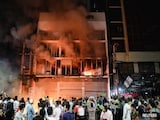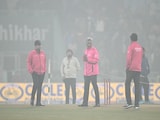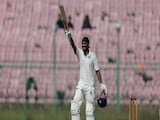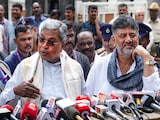As many as 50 eligible bachelors, clad in wedding costumes, riding horses and accompanied with 'band, baja and baraat' took out a procession, not to a marriage hall but to the Solapur collector office to seek brides, highlighting the issue of skewed male-female ratio in Maharashtra.
The extravaganza was part of a 'bridegroom morcha' organised on Wednesday by a local outfit which later submitted a memorandum at the district collector's office seeking strict implementation of the Pre-Conception and Pre-Natal Diagnostic Techniques (PCPNDT) Act to improve the male-female ratio in the state.
As per the National Family Health Survey (2019-21), Maharashtra's sex ratio was 920 females per 1,000 males.
Shilvant Kshirsagar, 29, who runs a dairy business, was among the 50 eligible bachelors seeking brides for themselves.
"I am 29 years old, unmarried, and hail from a rural part of Solapur district. We have a family dairy business and also do farming on two-acre land. Every time a marriage proposal comes, the prospective bride's first question is whether I live in a city and have a job or not," he told PTI.
Shilvant Kshirsagar said so far there have been 25 marriage proposals for him but in most of the cases, the woman's side rejected the proposal after coming to know he does not live in a city and does not have a job.
"I have also put up my profile on some matrimonial sites and marriage bureaus, but in vain," he said. This shows no woman wants to marry a man who lives in a rural area, Shilvant Kshrisagar added.
Audumbar Mali, 27, a Mohol tehsil native who does tailoring work and owns two-acre farmland, has a similar story.
"I have so far received eight marriage proposals, but the first question from the woman's family is whether I have a proper job or not. The next question is whether we have adequate farmland. It seems they have higher expectations about a bridegroom's financial condition," he said.
The present condition of eligible bachelors not getting brides is also because of the skewed male-female ratio, Audumbar Mali said. Had there been proper implementation of the PCPNDT act, the situation would have been different, he added.
"Sex determination tests are still held despite there being a ban on it under the PCPNDT Act," he added.
Ramesh Baraskar, the founder of the Jyoti Kranti Parishad which organised the event said people may mock this morcha, but the grim reality is that youth of marriageable age are not getting brides just because the male-female ratio is skewed in the state.
"This inequality exists because of female foeticide and the government is responsible for this disparity," Ramesh Baraskar claimed.
(Except for the headline, this story has not been edited by NDTV staff and is published from a syndicated feed.)















